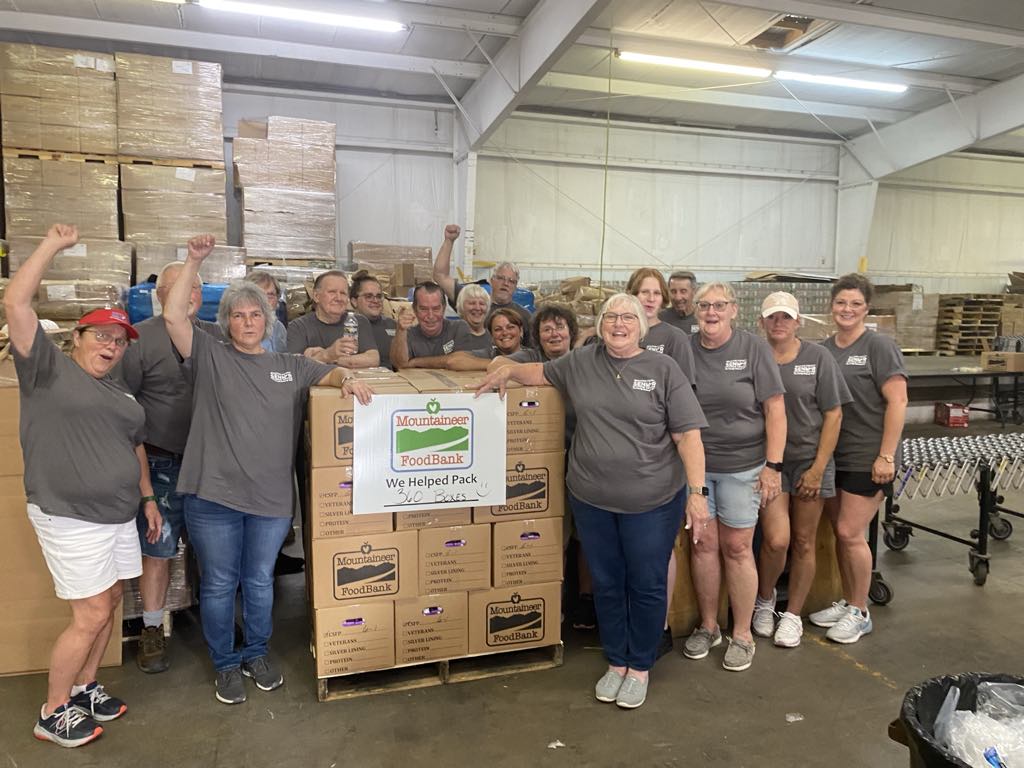September is Hunger Action Month, an annual campaign that aims to raise awareness about hunger and food insecurity in the United States.
Chad Morrison serves as development director at Mountaineer Food Bank, an organization based in Braxton County working to fight hunger statewide. Reporter Jack Walker talked to Morrison about hunger as an issue in West Virginia, and what every-day people can do to reduce it.
This interview has been edited for length and clarity.
Walker: Can you tell me about your organization?
Morrison: We’re a nonprofit based in Gassaway, West Virginia, right here in the center of the state. We serve 48 of the 55 counties by providing food and other resources primarily to other feeding programs — a lot of your food pantries, hot meal programs, really any organization that provides food to people in their community. So that’s our main focus: feeding people in West Virginia.
Walker: Can you tell me about the campaign you have going on right now?
Morrison: It’s an annual event. The entire month of September is designated as Hunger Action Month, which is supported by Feeding America, a national organization. So during the entire month of September, we’ve got different activities and actions that people can take to support the food banks, support their local feeding programs and just get involved in hunger relief.
So we build up a calendar of events throughout September that people can really take action from. Talking to their local government officials — whether it’s their mayor, their delegate, their senator, whoever is involved in their community — or volunteering at one of our events or at a local food pantry. So there’s a ton of ways that people can get involved in September, and we hope that by dipping their toe in it in September that they want to become involved all year long.
Walker: What can you tell me about hunger as an issue in West Virginia? How widespread is it?
Morrison: In West Virginia, one in seven of our neighbors is struggling with hunger. Over 300,000 people in the entire state and 260,000 in the counties that we serve. One in five of those are children. So West Virginia has about a 20% child food insecurity rate, which is really unbelievable. We focus on a lot of programs that help support children.
But we also have a lot of working families, a lot of seniors, a lot of veterans, all of our neighbors that are just struggling to make those decisions that they have to make when they don’t quite have the income to pay for utilities versus the medicine that they need to remain healthy. People have to make those choices. They’re buying healthy foods, or they’re buying foods that may not be quite what their body needs, especially whenever you look at so many people in West Virginia that struggle with chronic health issues.
A lot of the programs that are operated are really about trying to get food into areas that may lack food access, or to individuals that may have transportation issues or just don’t have the grocery access that they need for the healthy food options that we want to provide.
Walker: You mentioned earlier you encourage people to reach out to local elected officials to advocate for hunger relief. What does supporting hunger relief look like on a policy level?
Morrison: We really encourage people to share stories if they themselves have struggled with hunger, or if someone they know has. Really just bring that to a good, strong level with their policy makers.
Over the last couple years, we’ve been able to work with the governor’s office and the West Virginia Legislature to enact what’s called the Posey Perry Emergency Food Fund, which has allocated ten million state dollars to local food pantries in the state of West Virginia. That’s had a tremendous impact, because it’s allowed food pantries to secure the foods that they want to provide: healthy options, fresh produce, proteins, dairy, milk, eggs, things of that nature that are helping families just go a little bit further and improve their nutrition and their health. So that’s been a big, big step for West Virginia, and West Virginia is one of the only states that I know have allocated that large an amount towards hunger relief.
We want to keep that going. That’s not a permanent thing. That’s year to year. The legislature has to vote on it and approve it and keep it in the budget. But it’s been tremendous for everybody’s community. All 55 counties have been impacted by this, and it’s helping hundreds and hundreds of thousands of people in the state of West Virginia. So that’s a critical step for us.
Then, of course, as we try to build opportunities for people to gain income and improve their lives, we want to continue supporting [that] type of policies, and making sure that food access is key on everybody’s mind. It’s not easy for everybody to get to a grocery store. Some people have to rely on convenience stores or gas stations, things of [that] nature. So any types of policies that help improve healthy food access, whether it’s supporting a local farmer in your community or just being able to create those types of funds, are helpful to food access in West Virginia.
To learn more about Mountaineer Food Bank and other hunger relief efforts in West Virginia, visit the organization’s website.






















